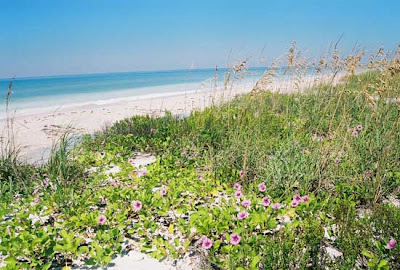Do Florida's State Parks Need Private Campgrounds?
 |
| Honeymoon Island State Park |
Passions are quickly rising to high levels over this issue. The public will have a chance to hear the facts as related by the DEP, and to give voice to their own opinions at meetings next week.
FNPS member Jan Allyn has this to say:
"Honeymoon Island State Park in Dunedin is on FDEP's list of parks that may get campgrounds. The goal, of course, is to generate revenue. Campgrounds require infrastructure--roads, parking, restrooms, trash disposal, etc. Those things will be installed at the expense of the natural environment, inevitably, and will fundamentally change visitors' experience of the park.
Is the addition of a campground at Honeymoon inevitable? Possibly. But even if it cannot be prevented, the public's input is invaluable in determining what type of camping will be allowed, and the size of the footprint that results. It could make the difference between what the state allows: low-impact tent camping or 30-foot-long RVs with noisy generators, electrical hookups and blaring TVs that disturb wildlife. Private concessionaires may say they care about the environment, but their first priority will be to push for what makes the most money, and the state has a financial incentive to do so as well."
Facts are in short supply right now, but Audubon has raised some good points, and it seems appropriate to copy a message from their website here. At the bottom is link to their page for addresses of meeting site. Audubon says:
Earlier this month, the Department of Environmental Protection sought permission from the state Acquisition and Restoration Council to pursue an expedited approval process for the development of private campgrounds in as many as 56 Florida State Parks. Over Audubon’s objections and the "no" votes of two Council members, the expedited process was overwhelmingly approved. Now DEP is proceeding with public meetings next week on campground proposals for four state parks.
These quickly assembled proposals would put family campgrounds including large RV developments in these sensitive preserved areas, potentially constructed and operated by the private sector. While public-private partnerships are not necessarily bad for our natural resources and camping helps introduce more people to Florida’s special places, these plans need careful, transparent consideration… and the benefit of your input!
Audubon's Concerns:
- In these amendments, “carrying capacities” for what use these parks can sustain are based on the number of parking spaces and facilities, not the amount of human use the resources can endure without being degraded.
- Campgrounds will mean more swimmers on the beach and in the springs; expanded hours during which the park must need to be patrolled for public safety and natural resource protection; and require additional resource management to ensure the parks are not degraded. How is the park service assessing these increased expenses and ensuring they are accounted for in these decisions?
- In order for a private vendor to bid accurately and for the resources to be protected appropriately, the park service needs to provide more detailed conditions for these campgrounds than is currently contained in the amendments.
 |
| Snowy plover eggs on beach |
Fanning, De Leon and Wakulla Springs are all windows to our aquifer surrounded by verdant wildlife habitat. Unfortunately, all three springs are already impaired by nutrients from stormwater run off, fertilizer and septic tanks. Do these proposals adequately consider and provide protections for these springs from the increased use and development of these campgrounds?
The meetings, one for each park, will all be held on Tuesday, July 5. You can find the addresses, the times and also view the proposals for each park by going to Audubon's Action page:
http://fl.audubonaction.org/site/MessageViewer?em_id=13861.0&printer_friendly=1
 | |||
| Wakulla Springs |
 |
| Alligator and native plants at Wakulla Springs |
sue dingwell



Comments
AND having our state parks well cared for is good for business. Florida will be more attractive and mores businesses will relocate here.